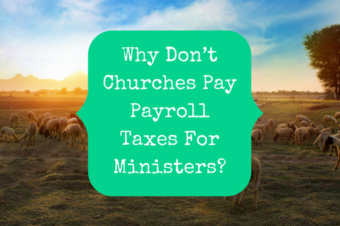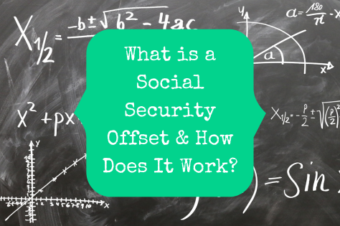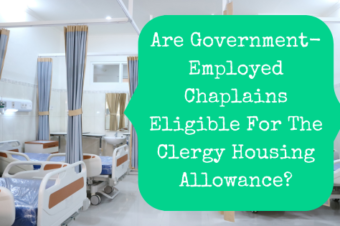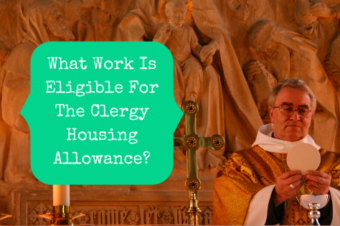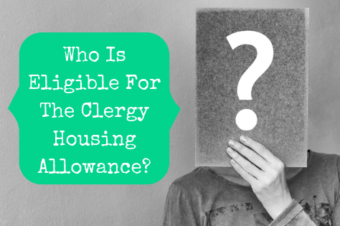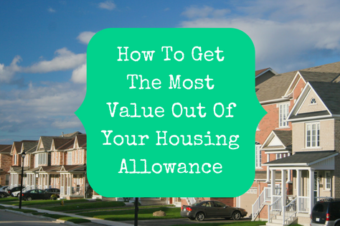Having a baby comes with a lot of responsibility and a long to-do list. Here are the things you should do legally and financially to set yourself up for success once your little one arrives.
Why Don’t Churches Pay Payroll Taxes For Ministers?
Tax season has just come to an end and most of us are either eagerly awaiting a return or bemoaning how much we had to pay. The rest of you filed an extension and are still trying to get your papers together or get your tax preparer to answer your calls. Isn’t tax season fun?
If you haven’t opted out of Social Security, then you would have filed Schedule SE to calculate your Social Security and Medicare taxes, also called payroll taxes. Front and center, in the biggest, boldest print is the title for Schedule SE: Self-Employment Tax. But if you’re a church employee and not self-employed, why are you filling out a form for self-employment taxes? Allow me to enlighten you.
Your Top 10 Clergy Housing Allowance Questions Answered
The clergy housing allowance is by far the most common topic that I receive questions about. Here are 10 or the most common questions answered to help you get the most value out of your housing allowance:
How does a housing allowance work?
- You, the pastor, calculate what your housing costs will be for the year and submit it to your church.
- Your church approves the housing allowance and does not include it as taxable income in box 1 of your W-2.
- You track your housing expenses throughout the year. Add any excess housing allowance to your taxable income on your tax return when you file.
- If you have not opted out of Social Security you need to include the housing allowance amount as income when calculating your self-employment taxes.
What expenses can be included in the housing allowance?
A housing allowance can cover:
- Down payment on a home purchase
- Mortgage principal and interest payments
- Property taxes
- Homeowner’s insurance
- Structural maintenance and repair
- Landscaping, gardening and pest control
- Furnishings (purchase, repair, replacement)
- Utilities (gas, electricity, water, internet) and trash collection
- Land telephone line
- Cable TV expenses
- Homeowner’s association dues/condo fees
Is the housing allowance the church’s or the pastor’s responsibility?
It is the pastor’s responsibility. The church’s only role is designating and paying the allowance. The pastor must calculate the allowance, document expenses and include the proper housing allowance amounts when filing his or her tax return.
Is a housing allowance considered income for tax purposes?
Not for income tax, but for self-employment taxes. If you have opted out of Social Security you do not pay self-employment taxes so your allowance does not affect your taxes. Housing allowances are exempt from most state income taxes, but you should double check with your particular state.
How much is exempt from federal income taxes?
The IRS specifies that only the lesser of the following can be excluded from your gross income:
- the amount actually used to provide or rent a home;
- the fair market rental value of the home (including furnishings, utilities, garage, etc.);
- the amount officially designated (in advance of payment) as a housing allowance; or
- an amount which represents reasonable pay for your services.
When should I request my housing allowance?
You should get your housing allowance approved prior to the beginning of the year or at the beginning of the year so that you don’t miss out on any of the benefits. An allowance can be approved at any time during the year, but only expenses incurred after the approval will be eligible for the housing allowance.
Is it better to overestimate or underestimate my housing allowance?
Overestimate. If you underestimate your expenses you cannot go back and increase your housing allowance. However, if you overestimate, you can make a correction by including the excess amount as taxable income when you file your taxes.
Can I change my housing allowance from year to year?
Most definitely. If your housing expenses change from year to year so should the allowance you request. When you plan on making a large purchase, such as a bed, deck or house, your requested allowance should include that amount. If you end up not making the purchase, you will simply adjust down the allowance when you file your taxes. If you don’t include the large expense, you will unnecessarily pay taxes on that amount.
Can I still take the mortgage interest deduction?
Yes. Receiving a housing allowance does not preclude you from deducting your home mortgage interest and real estate taxes if you itemize deductions.
Do I need to document my housing expenses?
Yes! Keep all receipts, bills, etc. that apply to your housing allowance. The IRS loves paper trails and if you get audited without one it could get ugly.
How Pastors Can Avoid Paying Social Security Taxes Without Opting Out
You didn’t opt out of Social Security because it doesn’t violate your conscience. But that doesn’t mean you like paying the tax. There are probably a lot of things you would rather do with that money. Do you have any other options?
Yes, you do. There is a legal way for you to avoid paying Social Security and Medicare taxes without opting out. And not only does it save you on taxes, but it’s really good for your future self as well. How do you do it? Make pre-tax contributions to your church’s retirement plan.
Pastors Pay Payroll Taxes Under SECA
Let me explain how that works. First, I have to remind you that pastors pay payroll taxes as if they were self-employed, under SECA. Confused? Read this article.
Because you pay as if self-employed, your payroll taxes do not come out of your salary automatically as they do for other employees. You calculate your payroll taxes when you file your income tax return each spring. To do so, you take your taxable wages reported on your W-2 and add them to your housing allowance and pay taxes on the total.
How Pre-Tax Retirement Contributions Work
Now we need to look at how retirement contributions work. When you make contributions to an employer’s retirement plan, your employer withholds the money before they pay you (and then sends it to your retirement account). The money never passes through your hands.
If they are pre-tax (not Roth) contributions, then they never show up in your taxable income, either. That’s why they’re called pre-tax because they are taken out before your income is calculated for income tax purposes. You pay your income taxes on that money when you withdraw it from the account in retirement.
Most employees still have Social Security and Medicare taxes taken out of the money that they contribute to their employer’s retirement plan. But not pastors. Because your church can’t withhold those taxes for you, you pay them on your own. You calculate those taxes based on what is reported as taxable income to you.
Lucky you, your retirement contributions don’t show up as taxable income. So you don’t have to pay Social Security and Medicare taxes on any of your pre-tax contributions to your church’s retirement account. And you don’t pay the taxes when you take the money out in retirement, either, you only have to pay income taxes. (Don’t worry, the IRS knows about this loophole and they are okay with it.)
How It Works In Real Life
In case you weren’t able to follow all of that, let me give you an example (ignoring any housing allowance for simplicity’s sake). Let’s say you earn $60,000 and you make pre-tax contributions to your church’s 403(b) totaling $10,000. Since the contributions are pre-tax, your W-2 only shows $50,000 of income. If you hadn’t contributed to a retirement plan, you would have a taxable income of $60,000.
What is the impact of that difference in taxable income? SECA taxes are 15.3%, though because of the way they are calculated they actually net out to 14.13%. You save $14.13 in taxes for every $100 pre-tax contribution you make. In our example, that’s a savings of $1,413! Pretty nice, right?
Claiming A Housing Allowance In Retirement
The icing on the cake is that you may even be able to avoid paying income taxes on the money when you take it out in retirement. Yes, you read that right. There is a way to get this money completely tax-free. How? Claim it as a housing allowance. Pastors are allowed to use money from a church retirement account as a housing allowance in retirement. This article elaborates on how that works.
How To Start A Church Retirement Plan
Does this article make you sad that your church doesn’t sponsor a retirement plan for you to contribute to? Don’t be sad, just start one! It’s not as expensive and onerous as you think. I was genuinely surprised by how affordable it can be when I sat down to discuss it with Paul McWilliams, an advisor who helps churches set up retirement plans. Here is a post he wrote for Pastor’s Wallet on setting up a church retirement plan.
If you’re thinking of starting a retirement plan, contact Paul or do a quick Google search to find some of the other companies that offer that service. I and my financial planning firm, Guide Financial Planning, do not set up retirement plans. At the moment, we only provide services for individuals.
The Different Kinds Of Income A Pastor Can Have & How The IRS Treats Them
This post breaks down all of the major types of income a pastor can earn and explains how the IRS treats them for Social Security, income tax, retirement plan and payroll tax purposes. It is based on IRS Publication 517.
What To Do If Your Clergy Housing Allowance Exceeds Your Actual Expenses
As we all know, nothing went quite as expected in 2020. In fact, for most of us, nothing went anywhere close to expected! Maybe you were planning on doing some work on your home and things got shut down because of COVID-19. Perhaps you were planning on spending some money on items for your home, but COVID-19 made you tighten your budget. Or things just didn’t go according to plan and it had nothing to do with COVID-19! (But we’re blaming everything on COVID-19 these days, right?)
While altering your plans is always annoying, it is a bit more significant for pastors when it comes to housing expenses. At the beginning of the year, you have to carefully estimate your yearly housing expenses in order to avoid paying taxes on them with the clergy housing allowance. You meticulously calculate your anticipated rent, utilities, home purchases, and big projects.
And then something like this happens. The whole world hits pause. Your plans get tossed by the wayside and your expenses were lower than the housing allowance that your church gave you. You should have been paying taxes on some of that money and you didn’t.
Now, what do you do?
Excess Housing Allowance Is Taxable Income
What the housing allowance is is a provision that allows you to exclude your housing expenses from gross income for federal tax purposes. At the beginning of the year, you tell your church how much of your income you plan to use for housing and that amount is not reported to the IRS as income.
However, if you don’t use it all for housing by the end of the year, you need to let the IRS know and pay federal income taxes on the rest. Let’s see what that looks like in real life.
Say your church pays you $60,000 a year. You designate $25,000 of that as a housing allowance so your church only reports to the IRS that you had $35,000 of taxable income.
If you only spend $22,000 on housing for the year, you have an extra $3,000 that you should have paid taxes on but didn’t. You need to add that extra $3,000 of housing allowance back into your income and pay taxes on it. Not doing so is tax evasion and will get you into trouble if the IRS audits you.
How To Report Your Excess Housing Allowance
So, how do you report it as income in order to pay taxes?
Add it in with your other wages on line 1 of your Form 1040. Then, on the dotted line next to it, write, “Excess allowance” and the amount. Here is an example:

Yes, it is as simple as that. Now it is added in with your wages for when your taxes are calculated.
That’s how to include it for income taxes, but what about SECA, your Social Security and Medicare taxes? Well, you don’t have to worry about that at all. Because you always have to pay SECA taxes on your housing allowance, claiming too much won’t make any difference in what you have to pay. You are already paying the full amount on Schedule SE.
What You Can Do Differently For Next Year
Now, while ending the year with excess housing allowance may have made your heart skip a beat and worried you a bit, it wasn’t that bad, was it? With such an easy way to correct it, it’s often better to err on the side of claiming too large an allowance than too small.
Too many pastors don’t claim a large enough housing allowance and end up needlessly paying extra taxes. The best way to avoid that and limit your tax bill is by overestimating your yearly housing allowance.
There is one thing I need to note, though. There is a potential downside to overestimating your housing allowance.
Things To Watch Out For
Your housing allowance lowers your gross income for federal tax purposes and there are some important things that are limited by your gross income. The biggest one that most pastors need to watch out for is the refundable portion of the Child Tax Credit. Claiming too much of a housing allowance can actually limit the amount of money you can get. This article explains why. Contributions made to retirement accounts are also calculated and limited based on income. There is a chance that by overestimating your housing allowance you could negatively affect the amount of money that you can save for retirement.
Make sure to look into those two things before blindly following my suggestion that overestimating is better than underestimating. Remember, just because you read something on the internet doesn’t mean it’s necessarily best for your unique situation.
Now that you’ve fixed last year’s housing allowance, what about this year’s? Is it already approved by your church with an accurate estimate or overestimate?
If not, you’d better get on it! The housing allowance cannot be used retroactively, so every day you procrastinate is another day that you are paying taxes on your housing allowance unnecessarily. If you need to make a change, make one. The IRS does not limit the amount of changes you make to your housing allowance or the timing of them, as long as they are done proactively.

How Pastors Pay Federal Taxes
I recently received an email from a pastor’s wife of 15 years asking for clarification on how their taxes were paid. She was too embarrassed to ask their tax preparer after all this time, so I was a safe place to turn. (If you have any questions, no matter how dumb you may think they are, I’d be happy to help!)
She felt dumb asking, but it was unwarranted. Taxes for pastors are unusual and it’s very rare for someone to actually explain them to you when you enter the ministry. It took me a while to figure out how they all work, so I don’t fault anyone else for not knowing.
Today we are going to go over the three different options that pastors have for paying their taxes.
Five Facts About Ministerial Taxation
Before we get too far in, though, we need to lay the foundation for what we are going to be talking about. There are some basic facts that you need to understand about taxes for pastors before we get into how to pay them.
Pastors Are Dual Status Taxpayers
First, all “ministers” by the IRS definition are dual status taxpayers. That means that you pay income taxes as an employee but pay payroll taxes (Social Security and Medicare taxes) as if you were self-employed. Self-employed people pay these taxes under the SECA system. ALL ministers pay under the SECA system, it is not optional.
Churches Cannot Withhold SECA Taxes For Pastors
Second, churches are not allowed to withhold SECA taxes for pastors. Neither the pastor or the church has any say in the matter, that’s just the way it is. If a church withholds SECA taxes, it can mess up the pastor’s records with the Social Security Administration.
Churches Can Withhold Income Taxes For Pastors
Third, unlike SECA taxes, churches have the option to withhold income taxes for pastors. It is not required. Every other employer is required by law to withhold income taxes for their employees, but pastors are exempt from that. So, churches don’t have to withhold income taxes for their pastors but they can.
We Have A Pay-As-You-Go Tax System
Fourth, the US tax system is a pay-as-you-go system. That’s why we have employer withholdings. The IRS doesn’t want to wait until the end of the year to get your tax money. They want a little bit from every paycheck.
For self-employed people who don’t receive paychecks (and pastors who are treated as self-employed), that means they have to pay quarterly estimated payments four times a year. You do your own calculations for the amount that you pay quarterly, but if you don’t pay enough and have a big tax bill at the end of the year you can be penalized by the IRS.
SECA And Income Taxes Are Combined On Your Tax Return
Finally, when you file your tax return all of your taxes are lumped into one final bill. You calculate your income taxes and SECA taxes separately but then add them together. If you end up owing, you don’t write one check for SECA taxes and one for income taxes. If you get a refund, you don’t get two separate checks for each kind of tax. It all gets added together on your tax return.
In light of those five facts, these are the options that ministers have for paying their taxes:
Option #1: Quarterly Estimated Payments
Your first option is to handle everything on your own. Your church withholds nothing and pays you your full salary. Then you calculate your expected tax liability (both income and SECA taxes) each quarter and pay your estimated taxes. At the end of the year, you file your tax return to see how accurate your estimates were and either get a refund or owe a little bit more.
Option #2: Quarterly Estimated Payments & Employer Withholding
The second option is to split the responsibility with your church. You have them withhold income taxes from your paycheck and you handle the SECA taxes on your own. You calculate your expected SECA taxes quarterly and pay them. Then, at the end of the year, you file your tax return and make sure to count the taxes that your employer withheld and the estimated payments you made when determining if you get a refund or owe more.
Option #3: Only Employer Withholding
The third option is to have your church withhold all of the taxes you will need to pay. Wait, what happened to “churches can’t pay SECA taxes for ministers?” It still applies. Your church can withhold all of the taxes that you will need to pay if they are all labeled as income taxes, not SECA taxes. For example, if your SECA taxes from every paycheck would be $150 and your federal income taxes from each paycheck are $150, you can have your church withhold $300 for income taxes from each paycheck.
That way, you know that the IRS is happily getting everything they need on a regular basis, even though it is mislabeled. At the end of the year when you file your tax return, it will look like you overpaid income taxes and underpaid SECA taxes but it will all even out. Remember, in the end, they are lumped together for one tax bill. As long as you paid enough and don’t end up owing a lot, the IRS doesn’t mind.
There you have it, the three different options that pastors have for paying their taxes. If you want to do options #2 or #3, you’ll have to make sure that your church is willing to cooperate. And, as you file your tax return this year, make sure that anyone who is helping you understands ministerial taxes because not all paid preparers do!



